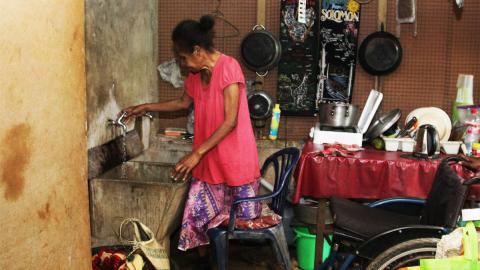
Our approach to inclusive water, sanitation and hygiene programming
In 2010, the United Nations General Assembly explicitly recognised the human right to water and sanitation, stating that “everyone has the right to sufficient, continuous, safe, acceptable, physically accessible, and affordable water for personal and domestic use.”
In 2019, World Vision – in partnership with the London School of Hygiene and Tropical Medicine, the Ministry of Justice and Community Services, the Vanuatu National Statistics Office (VNSO), Vanuatu Disability Promotion and Advocacy Association and Vanuatu Society for People with Disability – undertook a Water, Women, and Disability (WWD) study in Sanma and Torba Provinces.
The study found that while 91% of all households surveyed had access to an improved water supply, for more than half (57%) of those households, water was not available every time it was needed in the last three months, with no difference between rural and urban locations.
In these provinces, the WWD study found people with disabilities were substantially less likely to collect water themselves compared to persons without disabilities (66% versus 93%). This was true across age groups, by sex and by rural and urban location. Amongst those who did collect water, persons with disabilities were less likely to feel safe (84% vs 95%). In addition, 10% of people with disabilities reported not being able to access water at home when they needed it, compared with less than 1% of people without disabilities.
While the study found that 55% of households had access to an improved sanitation facility*, with no difference depending on whether there was a person within the household with a disability or not, 32% of people with disabilities found it difficult to use the toilet without coming into contact with faeces or urine.
World Vision Vanuatu works with and through our partners to deliver holistic, inclusive water, sanitation and hygiene (WASH) programming that uses WASH as a vehicle to improve the health and well-being of people with disabilities and women, through access to gender-equitable and disability-inclusive WASH systems. Throughout our inclusive WASH programming, we seek to bring attention to issues that are often neglected in the WASH sphere, such as menstrual hygiene management (including for people with disabilities) and continence management.
*Improved sanitation facilities definition: those designed to hygienically separate excreta from human contact, and include: flush/pour flush to piped sewer system, septic tanks or pit latrines; ventilated improved pit latrines, composting toilets or pit latrines with slabs